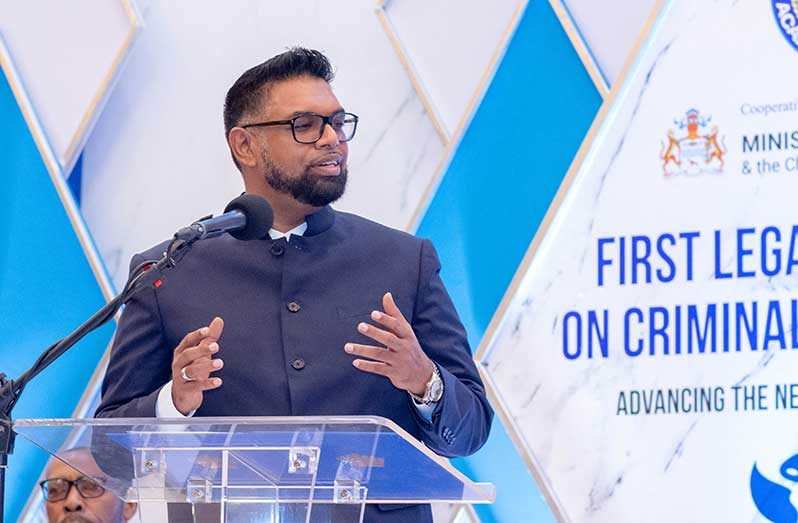THE Government of Guyana, together with the Attorney General’s Chambers and the Ministry of Legal Affairs, has initiated the inaugural “Legal Conference on Criminal Justice Reform – Advancing the Needham’s Point Declaration,” as a major step towards modernising and adapting the country’s legal framework.
The Needham’s Point Declaration covers key areas related to criminal justice reform, including policy and legislative interventions, prosecution, police representation for the accused victims’ rights and judicial interventions. The declaration emphasises the need for swift justice for the guilty and protection of the innocent.
The two-day event commenced on Wednesday at the Guyana Marriott Hotel, drawing key legal figures and stakeholders from across the Caribbean.
In his keynote address, President Dr. Irfaan Ali emphasised the interconnected nature of the criminal justice system with various societal factors.
Addressing judges from the Caribbean Court of Justice, chief justices, chancellor, legal personnel, attorney-general, members of the diplomatic corps and stakeholders, President Ali underscored the need to recognise that “the criminal justice system does not operate in a vacuum.”

President Ali highlighted the importance of identifying the root causes of issues within the legal system to effectively address them.
He stated, “There are societal, environmental, cultural, economic, and value challenges, as well as new forms of normalisation, that the system must address as a region.”
He further noted that the normalisation of behaviour on a global scale and its regional impacts are critical aspects that need to be addressed within the criminal justice system.
“The best way to address this to avoid political and legal risks is if we do it as a community,” President Ali said.
He stressed that gatherings like that conference provide an opportunity to tackle major regional issues collectively, allowing for collective ownership and reducing risks associated with making bold decisions.
President Ali also spoke on the relationship between the criminal justice system, political stability, democracy, and the rule of law. He pointed out that criminal networks thrive on political unrest and undemocratic environments, making political stability and the rule of law essential for the effective operation of the justice system.
In his address, President Ali introduced the concept of “judicial predictability,” emphasising the importance of consistency in judicial decisions. He explained that the soundness of decision-making, the structure of the judiciary, and the quality and consistency of decisions are crucial elements of this concept. Highlighting discrepancies in rulings on similar cases by different magistrates, he cautioned against exposing the system to various assertions and stressed the need to preserve fairness and justice.
President Ali also emphasised the competence of lawyers and judges, particularly in an era where artificial intelligence is prevalent. He noted the future need for legal personnel to distinguish between AI-generated evidence and realistic evidence, stating, “Quality lawyers must be matched by exceptional judges, supported by a legislative framework that is fit for purpose.”
On a national level, President Ali acknowledged that the region lags in digitisation. However, he expressed the Government of Guyana’s support for the continuous educational advancement of the Caribbean Court of Justice (CCJ), indicating a willingness to partner with the CCJ in this endeavour.
Meanwhile, in his opening remarks, Attorney General and Minister of Legal Affairs, Anil Nandlall SC MP, emphasised the conference’s role as part of the Support for Criminal Justice System (SCJS) Project, funded by the Inter-American Development Bank (IDB). The primary objectives of this project are to reduce pre-trial detentions and increase the use of alternative sentencing.
He acknowledged the region’s lag in digitisation but reiterated Guyana’s commitment to supporting the continuous educational advancement of the Caribbean Court of Justice (CCJ). He emphasised the necessity for updated legislation and the swift implementation of
remedial measures to address current legal deficiencies.
The conference, a collaborative effort with the CCJ Academy of Law and funded by the Inter-American Development Bank (IDB), represents a crucial step towards advancing criminal justice reform in Guyana and the wider Caribbean. By addressing contemporary legal concerns and fostering regional collaboration, Guyana aims to build a more effective and equitable legal system.



.jpg)











